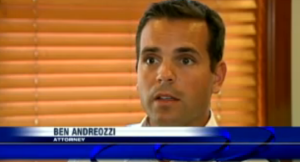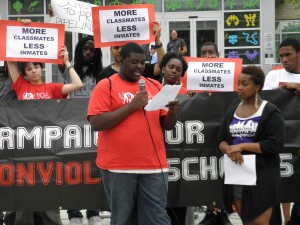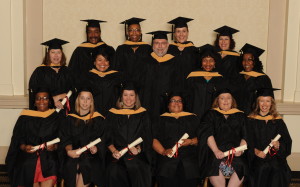News & Announcements
Greetings from Day Two of the IIRP's 15th World Conference, "Building a Worldwide Restorative Practices Learning Network."
Vidia Negrea, director of CSF Hungary and Victim Support Psychologist, Hungarian Ministry of Justice, presented the day's first plenary session, Family Group Conferencing/Family Group Decision Making as a Transition from Prison in Hungary Negrea discussed how she has been using FGC/FGDM with prisoners and their families throughout Hungary. She described how and why it works, defining it as a collaborative process between professionals and families that balances the need for security with the need for maintaining family ties. FGC/FGDM, she said, empowers families to make decisions based on their own strengths and resources; creates a safe place to deal with needs and feelings (past and present) and develops collaboration between the family network and the community.
Presented by Jean Schmitz in a plenary session on August 3, 2012, at the 15th IIRP World Conference, Building a Restorative Practices Learning Network, Bethlehem, Pennsylvania, USA, August 1-3, 2012
Presented by Steve Korr in a plenary session on August 2, 2012, at the 15th IIRP World Conference, Building a Restorative Practices Learning Network, Bethlehem, Pennsylvania, USA, August 1-3, 2012
I'm having a great time at the conference so far. It's a lively atmosphere with a lot of ideas being exchanged. I'm making new connections as well as reconnecting with old friends.
Laura Mirsky has posted this day-one conference report:
Presented by Stacey Miller in a plenary session on August 1, 2012, at the 15th IIRP World Conference, Building a Restorative Practices Learning Network, Bethlehem, Pennsylvania, USA, August 1-3, 2012
Earlier this summer I noted that Martin Wright received an honor at the European Forum for Restorative Justice. Here is a brand new piece by Wright, both timely and perceptive, in which he discusses the banking crisis and how white collar crime might be addressed through the use of restorative justice. In the middle of the piece Wright references John Braithwaite's influential work, Restorative Justice and Responsive Regulation, which lays out the theory and mechanism for an essentially restorative system of government oversight.
 Student activists with Dignity in Schools Campaign Get Creative in How They Express Their Desire for Changes in New York City Schools Discipline PolicyLast week I posted the news that the Michigan State Board of Education was recommending an end to zero tolerance policies in public schools in the state. The trend toward reevaluating these harsh counterproductive policies – which require schools to administer certain kinds of punishments, especially detentions, suspensions and expulsions, as a sanctioned response to specific student discipline code violations – continues and if anything is gaining steam. Recent reports have shown that minority students are disproportionately affected by these policies and are responsible in part for the shift in thinking and policy. Here are clips from three stories reexamining zero tolerance policies across the US. In some cases restorative practices have been offered as an alternative to punitive approaches. The passages below are all quoted text with links to full stories underneath each passage.
Student activists with Dignity in Schools Campaign Get Creative in How They Express Their Desire for Changes in New York City Schools Discipline PolicyLast week I posted the news that the Michigan State Board of Education was recommending an end to zero tolerance policies in public schools in the state. The trend toward reevaluating these harsh counterproductive policies – which require schools to administer certain kinds of punishments, especially detentions, suspensions and expulsions, as a sanctioned response to specific student discipline code violations – continues and if anything is gaining steam. Recent reports have shown that minority students are disproportionately affected by these policies and are responsible in part for the shift in thinking and policy. Here are clips from three stories reexamining zero tolerance policies across the US. In some cases restorative practices have been offered as an alternative to punitive approaches. The passages below are all quoted text with links to full stories underneath each passage.
 Benjamin Andreozzi, attorney for victim #4 in Sandusky trial from WGAL Interview
Benjamin Andreozzi, attorney for victim #4 in Sandusky trial from WGAL Interview
Benjamin Andreozzi, the lawyer for Victim No. 4 who was the first victim to testify in the Jerry Sandusky trial that dealt with molestation of boys at Penn State, has in a tv news interview criticized Penn State and the NCAA for going ahead with sanctions against the college without ever consulting the actual victims.
In an interview with WGAL News, Andreozzi says:
"The victims were not Penn State. The victims were not the NCAA. The victims were those young men who testified in the courtroom and I think NCAA and Penn State owed it to them to at least consult with them before rendering a decision."
 from the CNS Press ConferenceStudents and community activists in Philadelphia are not satisfied with the new draft of the school district's discipline code, according to an article the other day in the Notebook, which bills itself as "an independent voice for parents, educators, students and friends of Philadelphia public schools." According to the article, "Students push for changes in District's discipline policy" by Katie McCabe, members of the Campaign for Nonviolent Schools (see this blog post on past actions of this group) and others community groups were given input on the most recent draft of the code. But School Reform Commissioner Lorene Cary agrees the draft does not address student's major concerns. In response to the student feedback, "District officials are now working to write another draft of the code that is more responsive to student feedback."
from the CNS Press ConferenceStudents and community activists in Philadelphia are not satisfied with the new draft of the school district's discipline code, according to an article the other day in the Notebook, which bills itself as "an independent voice for parents, educators, students and friends of Philadelphia public schools." According to the article, "Students push for changes in District's discipline policy" by Katie McCabe, members of the Campaign for Nonviolent Schools (see this blog post on past actions of this group) and others community groups were given input on the most recent draft of the code. But School Reform Commissioner Lorene Cary agrees the draft does not address student's major concerns. In response to the student feedback, "District officials are now working to write another draft of the code that is more responsive to student feedback."
 The IIRP Class of 2012Saturday June 23 was a beautiful day for the commencement ceremony of the fifth graduating class of the IIRP Graduate School, held in the Grand Ballroom of the Hotel Bethlehem in Bethlehem, Pennsylvania, USA.
The IIRP Class of 2012Saturday June 23 was a beautiful day for the commencement ceremony of the fifth graduating class of the IIRP Graduate School, held in the Grand Ballroom of the Hotel Bethlehem in Bethlehem, Pennsylvania, USA.
Jeffrey Lyle Farr, Julia E. G. Getty, Angela Lorraine Hankins, Donald Lloyd Jackson, Stacy R. Phillips and Sharon Rose Jones Witbeck received Master of Science in Restorative Practices and Education.
Jacqueline Joyce Exum, Mary Jo Hebling, Robin C. Ide, Stephanie Mitchell, Yvonne Platts, Amarfi Ramirez-Acevedo, Michele Courtney Reinert, Eileen K. Richards, Alyssa Schmoyer and Josephine Torres-Boykins received the Master of Science in Restorative Practices and Youth Counseling.
